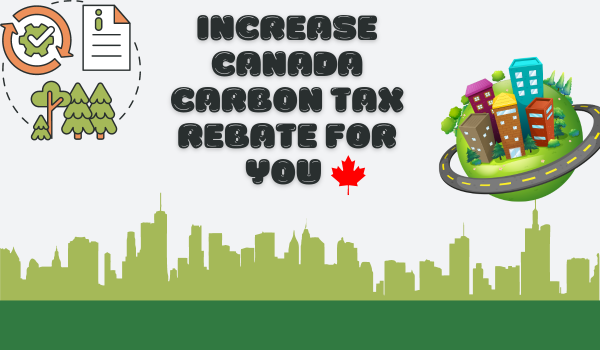Check the important details about the Increase Canada Carbon Tax Rebate for You: Tips To Make it Happen Legally, All We Know here. The government has increased the rates of carbon taxes from $65 to $80. these changes have led to increased tax rebates. Read the article to know more about the Increase Canada Carbon Tax Rebate for You.
Increase Canada Carbon Tax Rebate for You
The carbon tax is meant to be an effective initiative to reduce the usage of carbon and move towards a greener choice. The carbon tax rebates do these by increasing the prices of polluting fuels such as gasoline and diesel. The most recent hike increased the price of gasoline by 3.3 per cent per litre since the introduction of the tax rebates in 2019. This is the first time the taxes have gone up by 17.6 per cent per litre. For the current year, the values of the carbon taxes have been increased from $65 per tonne to $80 per tonne.
However, with the coming winter, it would be difficult for Canadians to heat up their houses and purchase of heating appliances due to these increased rates. To overcome these conditions, the government has intended to release carbon tax rebates. These rebates are issued to the citizens who are paying taxes for the usage of the files. These rates would be helpful in purchasing the necessary requirements in the coming week.
What is a Carbon Tax Rebate?
The carbon tax rebate is a tax-free benefit issued to help the infidels and households who are struggling due to the increased cost of fuel and gasoline. The rebates are paid to the eligible families in the provinces that are affected by the federal carbon prices. Majorly in the cold reason of the country, where the usage of the elasticity is less for hasting up the houses. This does not include the provinces of Quebec, North West Territories and B.C, to have their own carbon rebates and pricing programs. The residents of these regions are not eligible for federal rebates.

From 2018 to 2020, these events were named as Climatic Action Interventions. From 2021 to 2023, it was known as the Climatic Action Incentive Payments. It was renamed the Canada Carbon Rebate in early 2024. The amount is to be paid four times a month. It is deposited in the months of January, April, July and October. The date has been scheduled to be the 15th of each specified month.
Tips To Make it Happen Legally
In January 2024, around $2.3 billion has been distributed as part of the carbon tax rebates. These were approximately related to 12 million individuals across the country. The amount of the CCR deposit received depends upon the province and the number of eligible residents for the region. The breakdown of the carbon taxes in each province is shared in the table table.
| Province | Individuals | Spouse/Law partner | Per child under 19 | First child in a single-parent family | Annual Rebate for a family of four |
| Alberta | $225 | 112.50 | 56.25 | 56.25 | $450/$1,800 |
| Manitoba | 150 | 75 | 37.50 | 75 | $300/$1,200 |
| New Brunswick | 95 | 47.50 | 23.75 | 47.50 | $190/$760 |
| Newfoundland/ Labrador | 149 | 74.50 | 37.50 | 74.75 | $298/$1,192 |
| Nova Scotia | 103 | 51.50 | 25.75 | 51.50 | $206/$824 |
| Ontario | 140 | 70 | 35 | 70 | $280/$1,120 |
| PEI | 110 | 55 | 27.50 | 55 | $220/$880 |
| Saskatchewan | 183 | 94 | 47 | 94 | $376/$1,504 |
There is a rural supplement of 20 per cent added to the base amount. These amounts are released from the citizens living outside the city in the rural areas. These are for the ones who depend upon fossil fuels and have limited options for greener alternatives. More than 20 fuels that produce greenhouse emissions, such as coal, oil, and gasoline, affecting the fuel changes are considered for these tax rebates.
All We Know About Increase Canada Carbon Tax Rebate
According to the United Nations, fossil fuels such as coal, oil and gasoline are the largest contributors to global climate change. These account for around 75 per cent of global greenhouse emissions and 90 per cent of carbon dioxide emissions. Between 2005 to 2020, the emissions have been raised by 18.2 per cent. According to the Canadian climatic institutes, households need to carry the burden of the climatic related diesters in the country.
Since the carbon tax was introduced in April 2019 at the cost of $20 per tonne, it is supposed to increase by $15 per tonne until 2030, when till reaches $170 per tonne. From 2019 to 2022, the values have been increased by $10 each year.
From April 2024, gasoline has increased by 3.3 per cent in the country. With the beginning of the new fiscal year, the carbon tax rates are applied for the residents of Alberta, Saskatchewan, Manitoba, Ontario, Newfoundland, New Brunswick, Nova Scotia, Prince Edward Island, Yukon and the Nunavut.

Ruth Alba is a dedicated writer with a passion for creating original, insightful content. With a focus on delivering plagiarism-free work, he brings clarity and creativity to each piece. His work reflects a commitment to integrity, originality, and engaging storytelling that resonates with readers.


